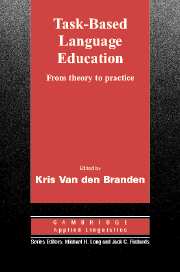Book contents
- Frontmatter
- Contents
- Acknowledgements
- Series Editors' Preface
- Chapter 1 Introduction: Task-based language teaching in a nutshell
- Chapter 2 From needs to tasks: Language learning needs in a task-based approach
- Chapter 3 Tasks for absolute beginners and beyond: Developing and sequencing tasks at basic proficiency levels
- Chapter 4 Developing language tasks for primary and secondary education
- Chapter 5 Task-based language teaching in science education and vocational training
- Chapter 6 Task-based language teaching and ICT: Developing and assessing interactive multimedia for task-based language teaching
- Chapter 7 Developing and introducing task-based language tests
- Chapter 8 The role of the teacher in task-based language teaching
- Chapter 9 A box full of feelings: Promoting infants' second language acquisition all day long
- Chapter 10 Training teachers: Task-based as well?
- References
- Subject Index
- Name Index
Chapter 3 - Tasks for absolute beginners and beyond: Developing and sequencing tasks at basic proficiency levels
Published online by Cambridge University Press: 05 May 2010
- Frontmatter
- Contents
- Acknowledgements
- Series Editors' Preface
- Chapter 1 Introduction: Task-based language teaching in a nutshell
- Chapter 2 From needs to tasks: Language learning needs in a task-based approach
- Chapter 3 Tasks for absolute beginners and beyond: Developing and sequencing tasks at basic proficiency levels
- Chapter 4 Developing language tasks for primary and secondary education
- Chapter 5 Task-based language teaching in science education and vocational training
- Chapter 6 Task-based language teaching and ICT: Developing and assessing interactive multimedia for task-based language teaching
- Chapter 7 Developing and introducing task-based language tests
- Chapter 8 The role of the teacher in task-based language teaching
- Chapter 9 A box full of feelings: Promoting infants' second language acquisition all day long
- Chapter 10 Training teachers: Task-based as well?
- References
- Subject Index
- Name Index
Summary
Introduction
Much of the research on task-based language teaching (TBLT) focuses on highly qualified students at intermediate stages of second language development (Bygate et al., 2001; Ellis, 2003). However, when dealing with learners of low education or with learners who have just started to learn a new language, the question arises whether a task-based approach still works. Many teachers believe that the language input inherent in task-based activities (such as the instructions needed to perform information-gap tasks) is too complex for absolute beginners. Likewise, absolute beginners are thought to lack the basic speaking skills needed to exchange information, negotiate meaning or scaffold each others' language output, all of which are supposed to ‘drive’ language learning according to task-based principles. In addition, some teachers believe it is impossible for second language learners to start using a language without explicitly knowing something about its simplest structures (syntax) and basic vocabulary first.
Nevertheless, there are some descriptions of task-based language learning for beginners. For instance, Willis (1996) gives an account of TBLT for beginners and young learners, implying that task-based language learning in these groups is possible. However, when she describes tasks suitable for these groups, these are mainly restricted to vocabulary-centred activities, often involving written language and focusing on form.
In this chapter, we will show that a task-based approach can be suitable and practicable at basic language levels, provided a number of conditions at the level of task design and task implementation are fulfilled.
- Type
- Chapter
- Information
- Task-Based Language EducationFrom Theory to Practice, pp. 47 - 75Publisher: Cambridge University PressPrint publication year: 2006
- 21
- Cited by



